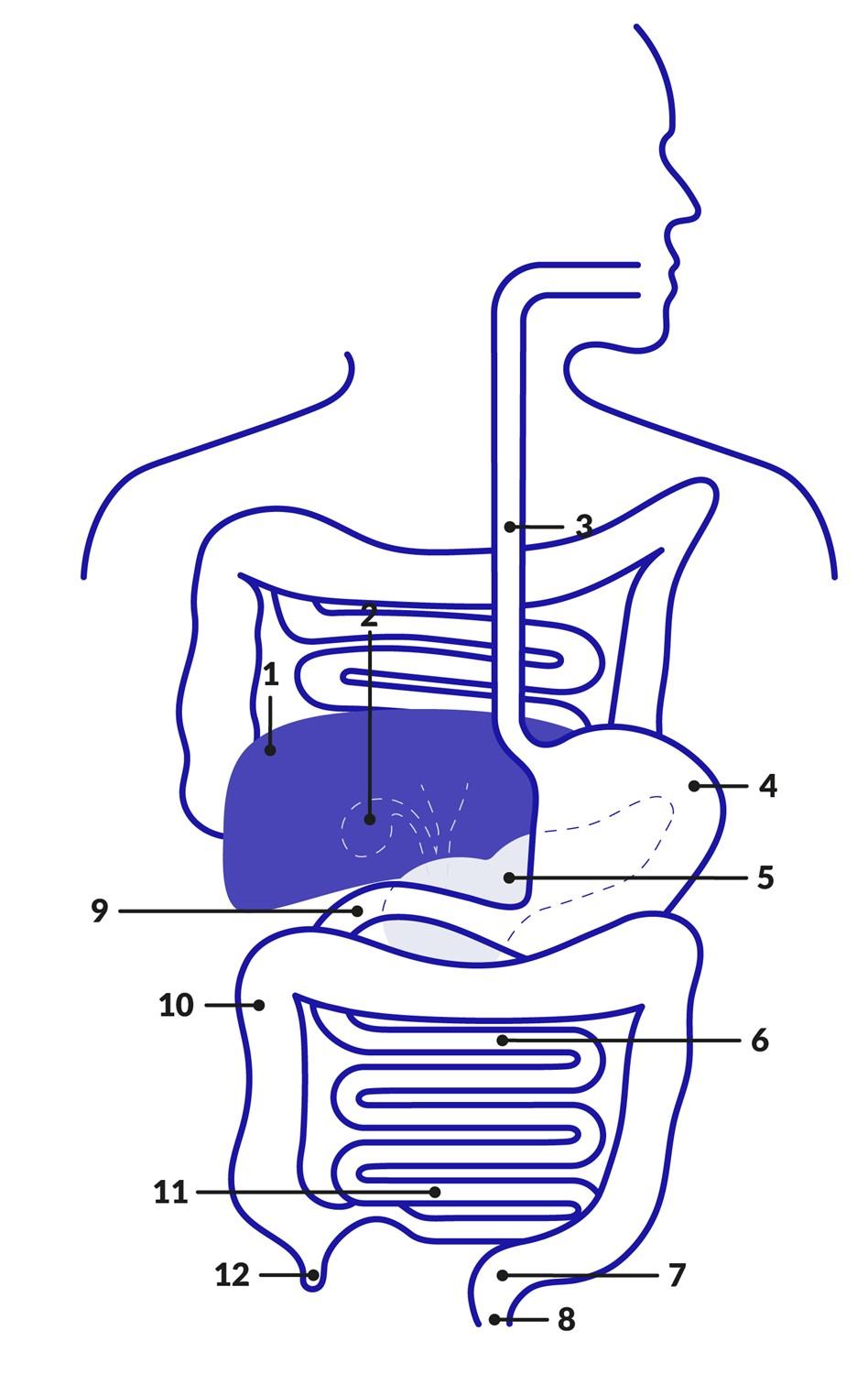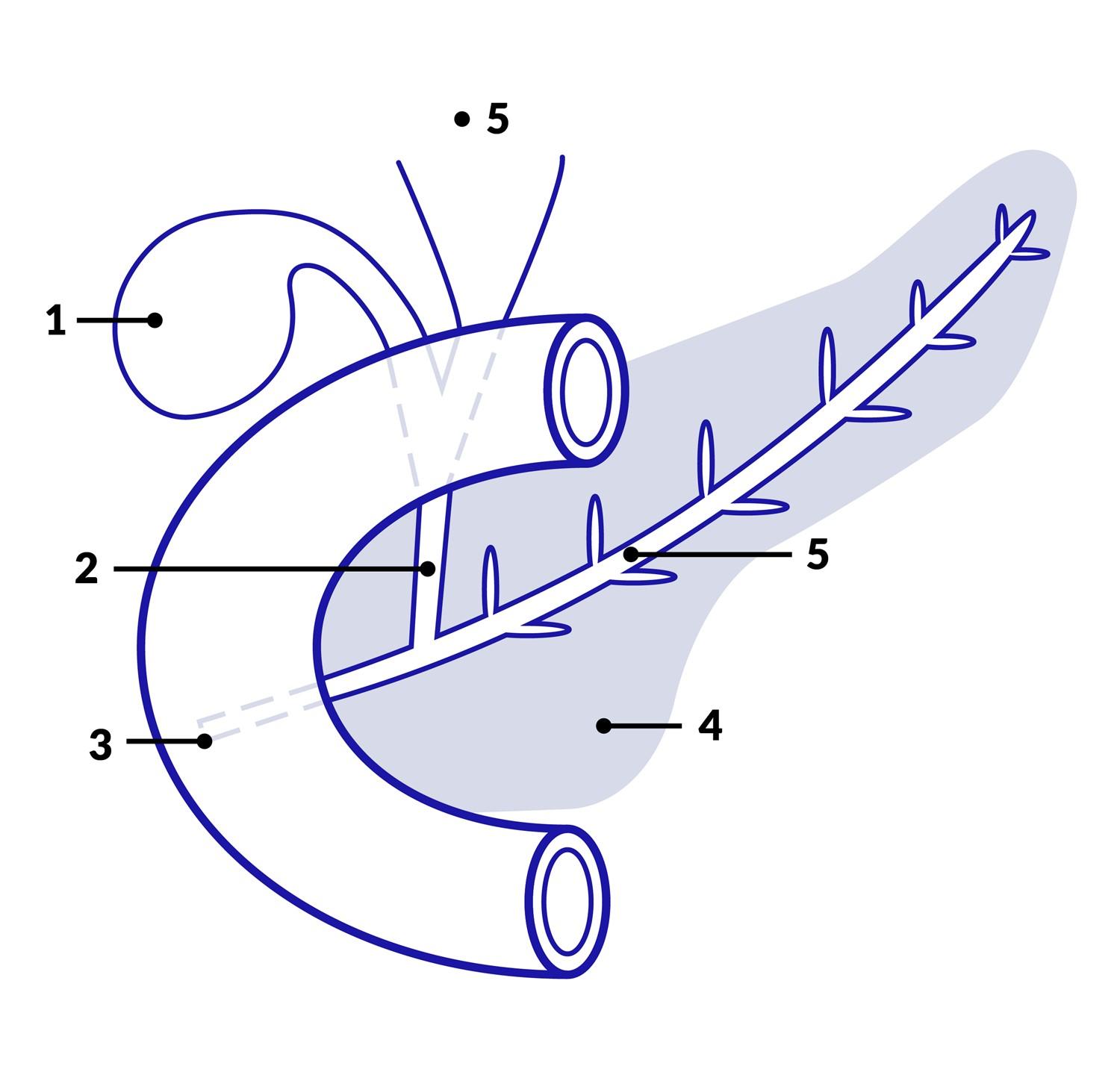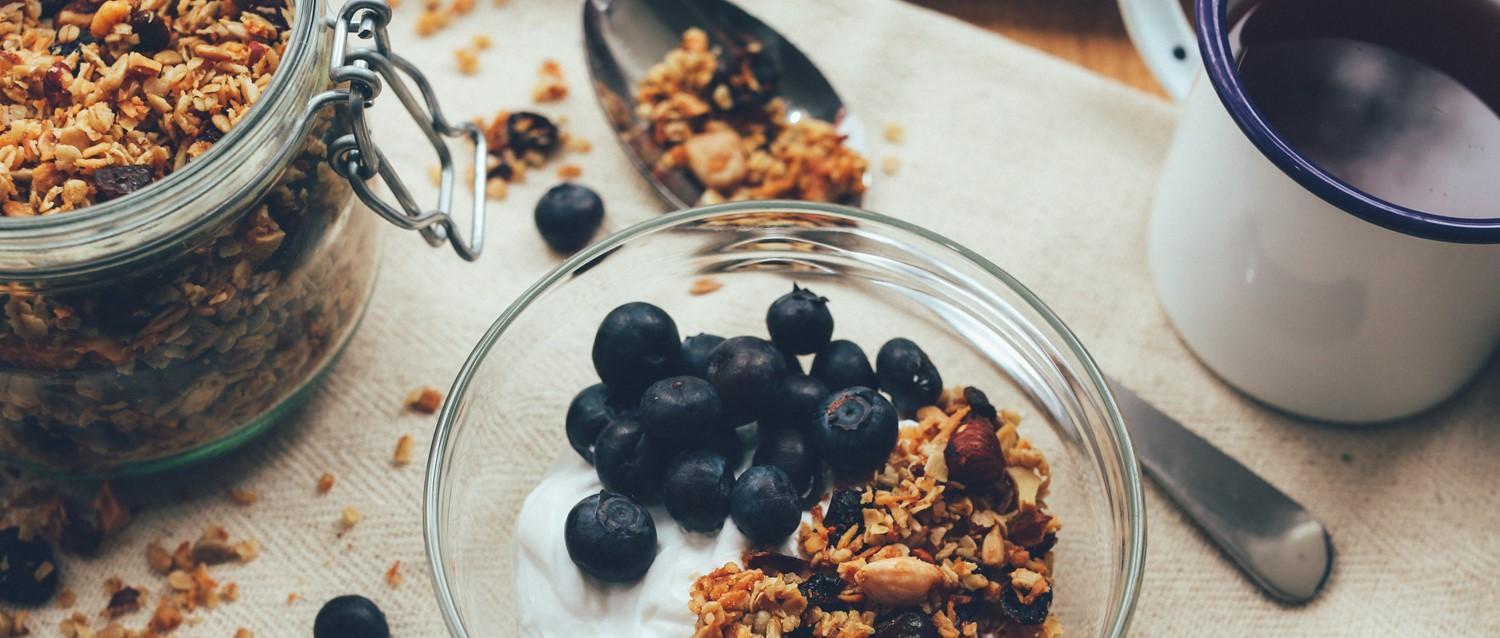
Welche Aufgaben hat die Bauchspeicheldrüse?
Peer reviewed by Dr Adrian Bonsall, MBBSAuthored by Dr Roger Henderson, MBBSOriginally published 30 May 2018
- HerunterladenHerunterladen
- Teilen Sie
Teilen Sie
The pancreas is an organ in the upper tummy (abdomen). Chemicals (enzymes) made by cells in the pancreas pass into the gut to help digest food. The hormones insulin and glucagon are also made in the pancreas and help to regulate the blood sugar level.
In diesem Artikel:
Lesen Sie unten weiter
What is the pancreas?
The pancreas is an organ which is about the size of a hand.
Cross-section of the gut

Schlüssel | |
|---|---|
1. Liver | 7. Rectum |
Where is the pancreas?
The pancreas is in the upper tummy (abdomen) and lies behind the stomach and guts (intestines). The pancreas has a connection via a tube (duct) to the first part of the gut (known as the duodenum) which is connected to the stomach. This connecting duct allows the chemicals (enzymes) produced by the pancreas to pass into the intestines.
Lesen Sie unten weiter
Welche Aufgaben hat die Bauchspeicheldrüse?
Die Bauchspeicheldrüse hat zwei Hauptfunktionen:
To make digestive chemicals (enzymes) which help us to digest food. Enzymes help to speed up your body's processes.
To make hormones which regulate our metabolism. Hormones can be released into the bloodstream. They act as messengers, affecting cells and tissues in distant parts of your body.
About 90% of the pancreas is dedicated to making digestive enzymes. Cells called acinar cells within the pancreas produce these enzymes. The enzymes help to make proteins, fats and carbohydrates smaller. This helps the guts (intestines) to absorb these nutrients. The acinar cells also make a liquid which creates the right conditions for pancreatic enzymes to work. This is also known as pancreatic juice. The enzymes made by the pancreas include:
Pancreatic proteases (such as trypsin and chymotrypsin) - which help to digest proteins.
Pancreatic amylase - which helps to digest sugars (carbohydrates).
Pancreatic lipase - which helps to digest fat.
Approximately 5% of the pancreas makes hormones which help to regulate your body's metabolism. These hormones are made by several different cells which clump together like little islands (islets) within the pancreas. The islets are called islets of Langerhans and there are about one million islets dotted about in an adult pancreas. The hormones made by the cells in the islets of Langerhans within the pancreas include:
Insulin - which helps to regulate sugar levels in the blood.
Glucagon - which works with insulin to keep blood sugar levels balanced.
Somatostatin - which helps to control the release of other hormones.
Gastrin - which aids digestion in the stomach.
How does the pancreas work?
The pancreas

Schlüssel |
1. Gallbladder |
The digestive chemicals (enzymes) made by the pancreas are controlled by the body's nervous system and its hormones. When the body senses food in the stomach, electrical signals are sent to the pancreas via nerves. These signals stimulate the pancreas to put more enzymes into the pancreatic juice. Acinar cells respond by increasing the amount of enzymes they produce. The enzymes leave the cells and pass into tiny tubes (ducts). These ducts join together like branches of a tree to form the main pancreatic duct. The pancreatic duct drains the enzymes produced into the first part of the gut, known as the duodenum.
The enzymes are made in an inactive form so that they don't digest the pancreas itself. Once they enter the intestines the enzymes are activated and can begin breaking food down.
The main hormones released by the pancreas are insulin and glucagon. These hormones help to regulate the amount of sugar found in the blood and the body’s cells. The body's cells need energy to function. The most readily available form of energy is glucose, a type of sugar. Insulin helps to take glucose from the blood into the cells themselves. This allows the cells to function properly. Glucagon stimulates cells in the liver to release glucose into the blood when levels are low.
The pancreas carefully monitors the level of glucose in the blood. When levels of glucose are high in the blood, cells within the pancreas make insulin. Insulin gets released into the bloodstream where it causes glucose to move into cells. This decreases the amount of glucose in the bloodstream, lowering blood sugar levels. Low blood sugar levels stimulate the pancreas to make glucagon. Glucagon works on cells in the liver, causing the release of glucose. If sugar levels in the blood rise above normal, the pancreas stops releasing glucagon. Insulin may then be released to balance the system again.
This system helps to keep the level of glucose in your blood at a steady level. When you eat, levels of sugar in your blood rise and insulin helps to bring them down. Between meals, when your sugar levels fall, glucagon helps to keep them up.
Lesen Sie unten weiter
Some disorders of the pancreas
Patientenauswahlen für Andere Verdauungsprobleme

Gesundheit der Verdauung
How your gut affects your overall health
We all know that when things aren't right with our digestion we can feel generally unwell. But evidence is mounting that the gut - which contains 70-80% of our immune tissue - could have an even greater impact on our overall health than once thought. It's time to listen to our gut feelings.
von Gillian Harvey

Gesundheit der Verdauung
Rotavirus
Rotavirus is a viral infection that causes symptoms of being sick (vomiting) and diarrhoea. In most cases the infection clears within a few days, but sometimes takes longer. The main risk is a lack of fluid in the body (dehydration) and so the main treatment is to give your child lots to drink. In the western world it usually does not cause any major problems, but in the developing world it is still a major cause of childhood death.
von Dr. Hayley Willacy, FRCGP
Artikel Geschichte
Die Informationen auf dieser Seite wurden von qualifizierten Klinikern geprüft.
30. Mai 2018 | Ursprünglich veröffentlicht
Verfasst von:
Dr. Roger Henderson, MBBSPeer-Review durch
Dr. Adrian Bonsall, MBBS

Fragen, teilen, verbinden.
Stöbern Sie in Diskussionen, stellen Sie Fragen, und tauschen Sie Erfahrungen zu Hunderten von Gesundheitsthemen aus.

Fühlen Sie sich unwohl?
Beurteilen Sie Ihre Symptome online und kostenlos